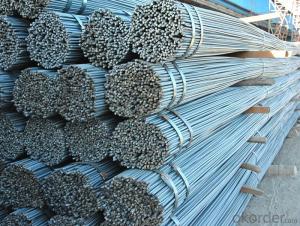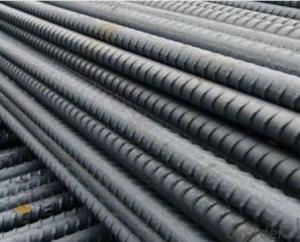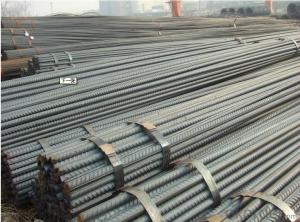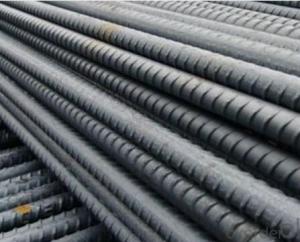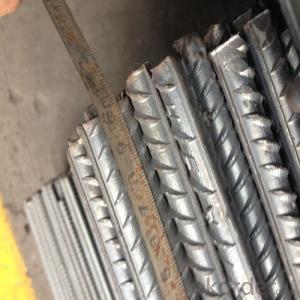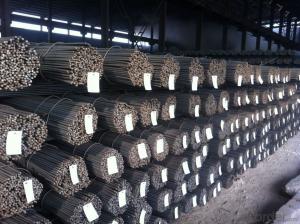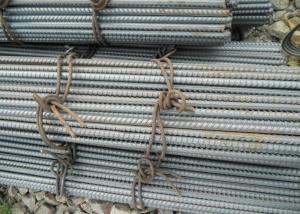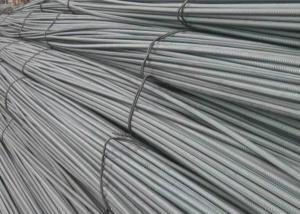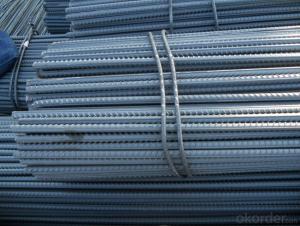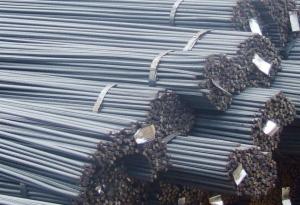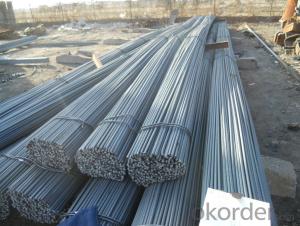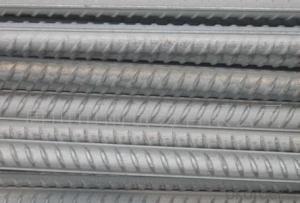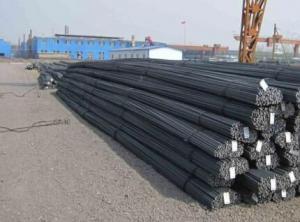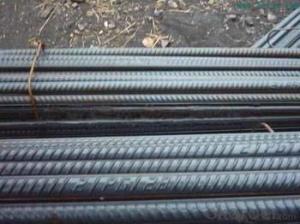Steel Rebar, Deformed Steel Bar,Iron Rods For Construction/Concrete/Building
- Loading Port:
- Shanghai
- Payment Terms:
- TT OR LC
- Min Order Qty:
- 100 m.t.
- Supply Capability:
- 1000 m.t./month
OKorder Service Pledge
OKorder Financial Service
You Might Also Like
deformed steel bar grade 40
material: HRB400, BS4449 GR460B
size: 8-36mmx12m.
short delivery time by bulk or container
deformed steel bar grade 40
material: HRB400, BS4449 GR460B
size: 8-36mmx12m.
short delivery time with bulk or container
packing: Mill standard export packing in bundles/coil, around 2tons/bundle.
country of Origin: China
delivery Time: Within a 35 days
Shipment: by bulk vessel or by container
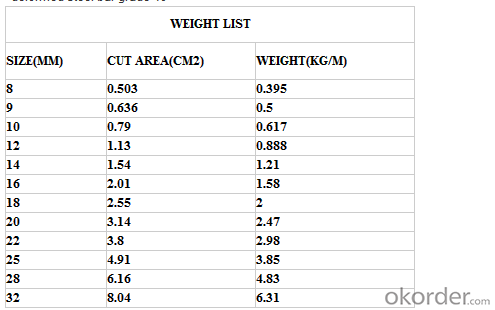
Leading goods:
section steel:angles,channels,I-beam,H-beam;
coils:cold/hot rolled coils,PPGI,galvanized coils,plate,checkered plate,cutting steel plate,steel strip;
wire rod:steel wire,deformed wire,bar;
pipe:seamless pipe,rectangular pipe,welded pipe,spiral welded pipe,pipe fittings;
stainless steel:steel sheets,stainless steel strips,stainless bar,stainless tube;
special:weathering steel,shipbuilding steel;
construction steel:C-channel,Z-channel,T-bar,high-speed divider plate,corrugated steel plate,steel grating.
Advantage:
We are the spot supplier, Six huge warehouses which can hold 20,000 MT goods.It makes the cost lower than others,we can provide the competitive price for you.
Delivery time:
Normal sizes can be provided in 7days, the others should be ready in 30---45 days.
Further treatment:
We can offer cutting,painting,drilling holes,bending,threading, welding,galvanization,packing etc.
Security interest:
We have already passed the ISO9001, BV and SGS authentication which makes the quality secured.
If you have the interest in any of the products we can provided, pls don't hesitate to connect with me. Looking forward to cooperate with you.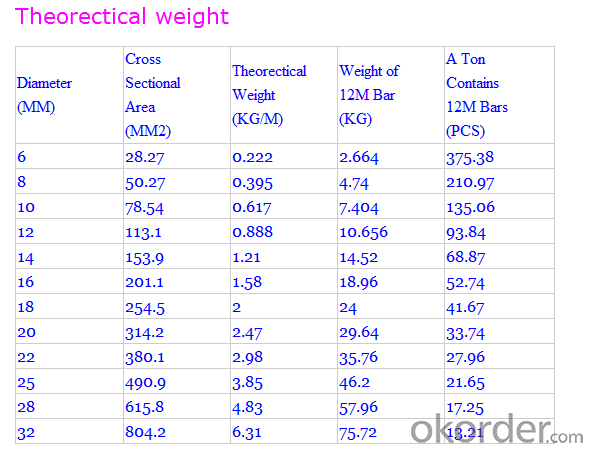
FAQ of Steel Deformed Bar
1. More than 10 years experience in this industry
2. 100,000 tons exporting per month
3. Professional foreign trade tea
4. OEM&ODM capacity
5. High quality assured & competitive price
6. Try our best to meet your needs & save your budget
7. Very popular in Southeast Asia, Africa, Mid-East and South America etc.
8. VIP membership system, first time customers and long-term cooperation customers can get extra discount on some products.
- Q:How are steel rebars protected against electromagnetic interference?
- Steel rebars are typically protected against electromagnetic interference through the use of concrete coverings, which act as a barrier and shield against electromagnetic waves. Additionally, proper grounding techniques and the use of high-quality concrete can further enhance the protection against electromagnetic interference.
- Q:What are the international standards for steel rebars?
- The international standards for steel rebars are set by various organizations and bodies such as the International Organization for Standardization (ISO), American Society for Testing and Materials (ASTM), and the European Committee for Standardization (CEN). ISO provides standards for steel rebars under ISO 15630, which covers both hot-rolled and cold-worked rebars. This standard defines the requirements for the chemical composition, mechanical properties, dimensions, and tolerances of rebars used in reinforced concrete structures. ASTM has developed several standards for steel rebars, including ASTM A615/A615M and ASTM A706/A706M. ASTM A615/A615M covers deformed and plain carbon-steel rebars for concrete reinforcement, specifying the chemical composition, mechanical properties, dimensions, and marking requirements. ASTM A706/A706M focuses on low-alloy steel rebars with improved weldability, suitable for use in concrete structures where welding is required. In Europe, CEN has established the Eurocode 2 (EN 1992-1-1) as the primary standard for steel rebars. This code provides design rules for the structural use of concrete and includes guidelines for the selection and use of rebars. Additionally, CEN has also developed EN 10080, which specifies the requirements for steel rebars for concrete reinforcement, covering chemical composition, mechanical properties, dimensions, and tolerances. These international standards ensure the quality and consistency of steel rebars used in construction projects worldwide. Compliance with these standards helps to ensure the safety and reliability of reinforced concrete structures by providing guidelines for material properties, manufacturing processes, and quality control measures.
- Q:How do steel rebars affect the overall lifespan of a structure?
- Steel rebars play a crucial role in enhancing the overall lifespan of a structure. The addition of rebars in reinforced concrete significantly improves the strength, durability, and structural integrity of the building. Firstly, steel rebars provide reinforcement to the concrete, making it capable of withstanding heavy loads and stresses. Concrete itself is strong in compression but lacks tensile strength. By incorporating rebars, the concrete is able to resist tension forces, preventing cracks and failures that could compromise the structure's longevity. Furthermore, steel rebars act as a barrier against corrosion. Concrete is a porous material, and when water and moisture penetrate its surface, it can reach the embedded steel, leading to rust and subsequent weakening of the structure. However, rebars are made of corrosion-resistant materials, such as stainless steel or epoxy-coated steel, which protect them from corrosion, ensuring the longevity of the structure. In addition, steel rebars enhance the overall stability and load-bearing capacity of the structure. By reinforcing critical areas, such as beams, columns, and foundation, rebars increase the structure's ability to resist seismic forces, wind loads, and other external pressures. This reinforcement significantly reduces the risk of structural failure and improves the structural lifespan. Moreover, steel rebars allow for flexibility and adaptability in design. Their availability in various sizes and shapes enables engineers to customize the reinforcement according to the specific needs of the structure. This flexibility ensures that the structure is optimized for maximum strength and durability, further extending its lifespan. In conclusion, steel rebars play a vital role in increasing the overall lifespan of a structure. Their ability to reinforce concrete, resist corrosion, enhance stability, and provide design flexibility ensures that the building can withstand various loads and environmental conditions, minimizing the risk of premature failure and ensuring the longevity of the structure.
- Q:Are steel rebars suitable for use in hospital construction?
- Indeed, steel rebars are a suitable option for hospital construction. Referred to as reinforcing bars, steel rebars are commonly utilized in construction projects to impart strength and stability to concrete structures. In the context of hospital construction, where safety and durability are of utmost importance, steel rebars offer numerous benefits. First and foremost, steel rebars possess remarkable tensile strength, enabling them to endure heavy loads and resist deformation. This attribute is critical in hospital construction, where the edifice must support the weight of medical equipment, patients, and other infrastructure. Furthermore, steel rebars bolster the overall structural integrity of the hospital, guaranteeing long-term stability and safety. Moreover, steel rebars exhibit excellent fire resistance properties. Hospitals are classified as high-risk establishments, as they house potentially flammable materials and electrical equipment. Steel rebars can endure high temperatures without compromising their strength, thus enhancing the structure's fire protection. Additionally, steel rebars are resistant to corrosion, shielding the concrete from damage caused by moisture and chemicals. Hospitals often experience elevated humidity levels and exposure to various chemicals employed in medical procedures. Through the utilization of steel rebars, the risk of corrosion and subsequent structural deterioration is minimized, ensuring a prolonged lifespan for the hospital building. Lastly, steel rebars are easily obtainable and cost-effective. Hospital construction projects frequently adhere to strict timelines, and the use of steel rebars enables efficient construction and swift installation. Furthermore, the market's abundance of steel rebars ensures competitive pricing, rendering them a cost-effective choice for hospital construction. In conclusion, steel rebars are unquestionably suitable for employment in hospital construction. Their high tensile strength, fire resistance, corrosion resistance, and cost-effectiveness render them an ideal selection for guaranteeing the safety, durability, and long-term stability of hospital structures.
- Q:How do steel rebars enhance the structural integrity of a building?
- In several ways, the structural integrity of a building is enhanced by steel rebars. Firstly, they reinforce and support concrete structures, including beams, columns, and slabs, preventing cracking or collapsing under heavy loads or external forces. The high tensile strength of steel rebars enables them to bear tensile stresses that concrete alone cannot handle, guaranteeing the building's stability and durability. Furthermore, steel rebars aid in evenly distributing and transferring loads throughout the structure, reducing concentrated stress. By reinforcing critical areas prone to tension, like corners, joints, and openings, rebars prevent cracks and ensure overall stability. Steel rebars also play a vital role in improving the structure's resistance to natural disasters like earthquakes and hurricanes. The flexibility and ductility of steel allow it to absorb and dissipate energy during seismic events or high winds, minimizing the risk of structural failure. This increased resilience ensures occupant safety and protects the building from severe damage. Additionally, steel rebars offer long-term durability by shielding the structure against corrosion. Unlike other construction materials, steel is highly resistant to degradation caused by environmental factors like moisture, chemicals, and temperature fluctuations. Corrosion-resistant rebars or protective coatings can significantly extend the building's lifespan. In conclusion, steel rebars are crucial components for reinforcing concrete structures, strengthening their integrity, stability, and resilience. By providing additional support and resistance to various stresses and loads, they contribute to the overall structural integrity of a building, guaranteeing its safety, longevity, and ability to withstand adverse conditions.
- Q:How do steel rebars prevent the concrete from cracking under tension?
- Steel rebars reinforce concrete and increase its structural integrity, preventing cracking under tension. Concrete has low tensile strength and tends to crack when subjected to tensile forces. However, when steel rebars are embedded in the concrete, they absorb and distribute these forces, acting as reinforcement. Typically made of high-strength steel, the rebars have a much higher tensile strength compared to concrete. As a result, when the concrete is under tension, the rebars bear most of the load, preventing cracking. The rebars act as a framework or skeleton within the concrete, resisting the tensile forces and ensuring its structural stability. Furthermore, the bond between the steel rebar and the concrete also plays a role in preventing cracking under tension. The ribbed or deformed surface of the rebars enhances the bond with the surrounding concrete, creating a strong connection. This bond allows the rebars to transfer the tensile forces to the concrete matrix more effectively, reducing the risk of cracking. By reinforcing the concrete, steel rebars help distribute the tensile forces evenly throughout the structure. This prevents localized stress concentrations and minimizes the chances of cracks forming. Additionally, if cracks do occur, the presence of rebars can help control their propagation by acting as barriers that restrict further spread. In conclusion, steel rebars provide reinforcement, increase the strength of concrete, and prevent cracking under tension. They bear the tensile forces, distribute them evenly, and enhance the bond between the rebar and the concrete. This reinforcement ensures the structural integrity of the concrete and helps prevent cracking.
- Q:How are steel rebars bent or shaped to fit specific construction requirements?
- Steel rebars are bent or shaped to fit specific construction requirements using various methods such as manual bending, mechanical bending machines, or hydraulic bending machines. These techniques involve applying force to the rebar, which causes it to bend or take on a desired shape. The specific method used depends on the complexity of the required shape and the quantity of rebars needed.
- Q:What is the effect of steel rebars on the weight of a structure?
- Steel rebars have a significant effect on the weight of a structure. Rebars are typically made of steel, which is known for its high strength-to-weight ratio. When incorporated into a structure, these reinforcement bars add strength and rigidity without significantly increasing the overall weight. By reinforcing concrete with steel rebars, the structure becomes better equipped to withstand various forces and stresses, such as tension, compression, bending, and shearing. This reinforcement allows the structure to handle heavier loads and increases its overall durability and longevity. While steel rebars add strength to the structure, they do not significantly contribute to its weight. This is beneficial as it allows for the construction of lighter and more efficient structures. The reduced weight can have several advantages, including lower construction costs, reduced material requirements, decreased transportation costs, and improved seismic performance. Moreover, the use of steel rebars also enables the construction of more slender and aesthetically pleasing structures. The increased strength provided by the rebars allows for the use of thinner concrete sections, resulting in sleek designs and more open spaces. In summary, the effect of steel rebars on the weight of a structure is minimal. Instead, their primary role is to enhance the structural integrity, strength, and durability of the building without adding excessive weight.
- Q:Can steel rebars be used in wastewater storage tanks?
- Yes, steel rebars can be used in wastewater storage tanks. Steel rebars are commonly used as reinforcement in concrete structures, including wastewater storage tanks. The rebars provide tensile strength to the concrete, making it more resistant to cracking and improving the overall structural integrity of the tank. Additionally, steel rebars are corrosion-resistant, which is crucial in wastewater storage tanks where exposure to corrosive elements is inevitable. Therefore, using steel rebars in wastewater storage tanks is a common and effective practice in the construction industry.
- Q:Can steel rebars be used in precast concrete applications?
- Yes, steel rebars can be used in precast concrete applications. They provide structural reinforcement to the precast concrete elements, enhancing their strength and durability.
1. Manufacturer Overview |
|
|---|---|
| Location | |
| Year Established | |
| Annual Output Value | |
| Main Markets | |
| Company Certifications | |
2. Manufacturer Certificates |
|
|---|---|
| a) Certification Name | |
| Range | |
| Reference | |
| Validity Period | |
3. Manufacturer Capability |
|
|---|---|
| a)Trade Capacity | |
| Nearest Port | |
| Export Percentage | |
| No.of Employees in Trade Department | |
| Language Spoken: | |
| b)Factory Information | |
| Factory Size: | |
| No. of Production Lines | |
| Contract Manufacturing | |
| Product Price Range | |
Send your message to us
Steel Rebar, Deformed Steel Bar,Iron Rods For Construction/Concrete/Building
- Loading Port:
- Shanghai
- Payment Terms:
- TT OR LC
- Min Order Qty:
- 100 m.t.
- Supply Capability:
- 1000 m.t./month
OKorder Service Pledge
OKorder Financial Service
Similar products
New products
Hot products
Related keywords
